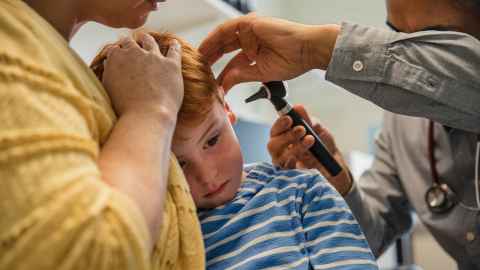Could healthy ‘nose bugs’ protect against glue ear?
27 March 2019
It’s now well known that probiotics can support a healthy mix of gut bugs; new research suggests they could one day also protect against glue ear by rebalancing the bugs in people’s noses.

The new study, published in scientific journal PLOS One, has shown for the first time that children with glue ear have a different community of nasal bacteria, which is less diverse with higher levels of ‘bad’ bugs, or pathogens, compared with healthy children.
Glue ear, or chronic otitis media with effusion, is where thick fluid gathers in the space behind the ear drum (middle ear) for three months or longer. Around one in 20 preschool children are affected by glue ear at any one time, making it the leading cause of hearing loss in this age group. By dulling hearing, glue ear can also interfere with language development.
For a long time, scientists believed glue ear did not involve bacteria, and may have been caused by dysfunction in the Eustachian tube, which connects the middle ear to the upper throat and back of the nose.
But many researchers now believe that glue ear, like ear infections, is caused by harmful bacteria invading the middle ear.
Viral infections such as colds may disrupt pathogens living relatively harmlessly in the nasal passages, causing them to overgrow and cause conditions such as glue ear.
An international team led by University of Auckland researchers in Aotearoa New Zealand wondered if the mix of bacteria in the nasal passages may affect the risk of harmful bacteria travelling from the nose to the middle ear and causing glue ear.
The researchers took samples of nose bugs from 73 preschool children with glue ear and 105 healthy children, and compared the type and quantity of bacteria.
Explains lead author, Dr Rebecca Walker, from the University of Auckland Faculty of Medical and Health Sciences: “We found that the healthy children had a more diverse community of bacteria in their noses, and high levels of bacteria known to be non-harmful and which may sometimes have health benefits.
“Viral infections such as colds may disrupt pathogens living relatively harmlessly in the nasal passages, causing them to overgrow and cause conditions such as glue ear.”
Dr Walker, who is an honorary research fellow in the Department of Paediatrics, Child and Youth Health in the School of Medicine, says this suggests that a healthy nasal microbiome may protect against glue ear.
“It may be possible to reduce the risk of bacterial overgrowth through the use of probiotics to shift the balance of bacteria towards the neutral or ‘healthy’ nose bugs, which could help prevent glue ear developing.”
The next step would be to run a randomised, controlled trial to see if probiotics can change the nasal microbiome, and whether this can protect against glue ear.
The study, was co-authored by Professor Edwin Mitchell, Associate Professor John Thompson and Senior Research Fellow Dr Caroline Walker also from the University of Auckland, and researchers from Manukau SuperClinic, Massachusetts General Hospital, and Harvard Medical School. It was funded by the Brian John Fellowship Trust.
Read the article:
PLOS One: Nasal microbial composition and chronic otitis media with effusion: A case-control study
Media contact
Nicola Shepheard | Media Adviser
Tel: +64 9 923 1515
Mob: +64 27 537 1919
Email: n.shepheard@auckland.ac.nz